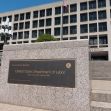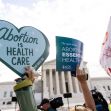U.S. District Judge David Joseph has blocked the U.S. Equal Employment Opportunity Commission (EEOC) from enforcing a rule that would require two states and a group representing Catholic bishops to accommodate employees who undergo elective abortions. The decision, issued on Monday, restricts the application of a federal pregnancy accommodation law that the EEOC had extended to cover abortions.
Judge Joseph, appointed by former President Donald Trump, sided with the Republican attorneys general of Louisiana and Mississippi, the U.S. Conference of Catholic Bishops, and other Catholic-affiliated groups. He ruled that the EEOC overstepped its authority by interpreting abortion as a "medical condition" that employers must accommodate under the federal pregnancy accommodation law.
"The EEOC’s arguments to the contrary amount to little more than semantic gymnastics," Joseph wrote in his decision. The ruling prevents the EEOC from enforcing this rule against the plaintiffs while their lawsuit, which seeks to permanently nullify the rule, proceeds.
Louisiana Attorney General Liz Murrill praised the decision, stating that Congress never intended for the pregnancy law to include abortions. She lauded Judge Joseph's "common sense interpretation" of the law. Laura Wolk Slavis, a lawyer with the Becket Fund for Religious Liberty representing the Catholic groups, called the EEOC rule "an abuse of power."
The U.S. Department of Justice, defending the EEOC's rule, has not yet commented on the ruling.
This decision follows a contrasting ruling by a federal judge in Arkansas, who upheld the EEOC rule in a lawsuit brought by 17 Republican-led states. The Arkansas judge ruled that the states lacked standing to challenge the rule and found it reasonable for the EEOC to consider abortion a medical condition related to pregnancy.
These conflicting rulings suggest a potential legal battle that could escalate to the U.S. Supreme Court, as appeals are likely from both sides.
The EEOC rule, set to take effect on Tuesday, was designed to implement a law passed by Congress in 2022 with bipartisan support and backing from major business groups. This law requires most employers to provide accommodations, such as time off for medical appointments or limits on heavy lifting, to workers who are pregnant or have related medical conditions.
However, the application of this rule to elective abortions has been contentious, particularly in states like Louisiana and Mississippi, which have near-total abortion bans with limited exceptions. According to the Guttmacher Institute, 14 U.S. states now ban nearly all abortions, with several others imposing severe restrictions.
The lawsuits challenging the EEOC rule are consolidated under the titles Louisiana v. EEOC and United States Conference of Catholic Bishops v. EEOC, in the U.S. District Court for the Western District of Louisiana, with case numbers 2:24-cv-00629 and 2:24-cv-00691.






